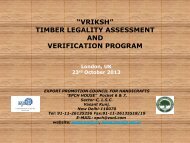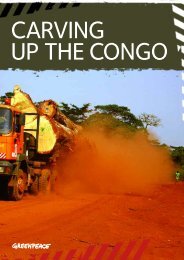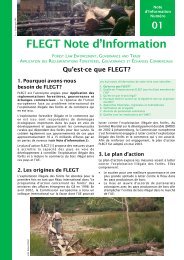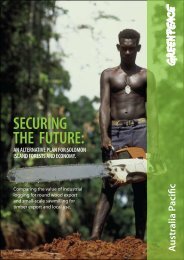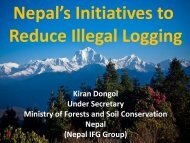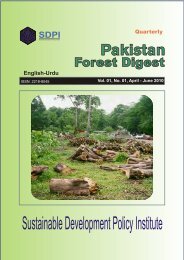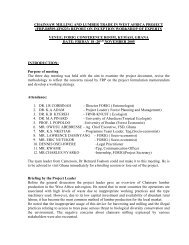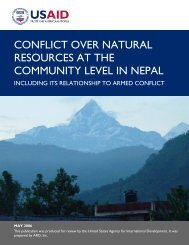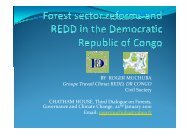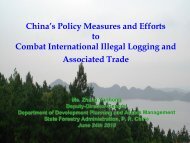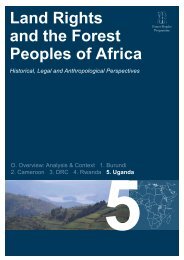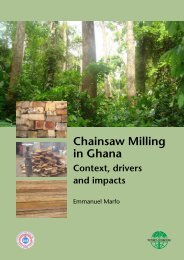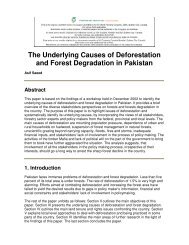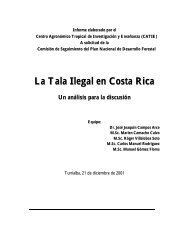SIM - Illegal logging in Cameroon's rainforest - Greenpeace
SIM - Illegal logging in Cameroon's rainforest - Greenpeace
SIM - Illegal logging in Cameroon's rainforest - Greenpeace
Create successful ePaper yourself
Turn your PDF publications into a flip-book with our unique Google optimized e-Paper software.
<strong>SIM</strong> - <strong>Illegal</strong> <strong>logg<strong>in</strong>g</strong> <strong>in</strong> <strong>Cameroon's</strong> ra<strong>in</strong>forest October 2005<br />
Cameroon’s Forest of the Great Apes: The lowland ra<strong>in</strong>forest of Cameroon forms part<br />
of Africa’s stunn<strong>in</strong>g Forest of the Great Apes. This forest supports thousands of species<br />
of plants and animals and is one of the world’s last rema<strong>in</strong><strong>in</strong>g strongholds of species such<br />
as lowland gorillas, chimpanzees and forests elephants. It is also home to millions of<br />
forest-dependant people. Their future is under threat, as illegal and destructive <strong>logg<strong>in</strong>g</strong><br />
operations encroach deeper and deeper <strong>in</strong>to this fragile forest.<br />
In recent years, a number of official reports published by the Cameroonian Government<br />
and the World Bank have revealed the widespread nature of illegal activities with<strong>in</strong><br />
Cameroon’s <strong>logg<strong>in</strong>g</strong> <strong>in</strong>dustry. 1 These activities cost the Cameroonian Government<br />
millions of euros each year <strong>in</strong> lost revenue. 2 Many companies have been f<strong>in</strong>ed for illegal<br />
practises such as tax evasion, <strong>logg<strong>in</strong>g</strong> outside legal boundaries, <strong>logg<strong>in</strong>g</strong> after permits have<br />
expired, cutt<strong>in</strong>g undersized trees and <strong>logg<strong>in</strong>g</strong> <strong>in</strong> unallocated concession areas.<br />
One of the ma<strong>in</strong> factors that is driv<strong>in</strong>g this corrupt, destructive and economically<br />
<strong>in</strong>efficient <strong>in</strong>dustry is the demand for cheap timber from the <strong>in</strong>ternational marketplace;<br />
the import<strong>in</strong>g nations who choose to ignore what is go<strong>in</strong>g on <strong>in</strong> the forest and just carry<br />
on with bus<strong>in</strong>ess as usual.<br />
Société Industrielle de Mbang (<strong>SIM</strong>): The Cameroonian based timber company Société<br />
Industrielle de Mbang (<strong>SIM</strong>) is <strong>in</strong>volved <strong>in</strong> large-scale illegal <strong>logg<strong>in</strong>g</strong> <strong>in</strong> Cameroon, both<br />
directly and <strong>in</strong>directly. This company has a history of illegal <strong>logg<strong>in</strong>g</strong> activities and has<br />
been <strong>logg<strong>in</strong>g</strong> illegally outside the boundaries of its cutt<strong>in</strong>g permit dur<strong>in</strong>g <strong>in</strong> the last<br />
twelve months. It also sources from a variety of other permits held by Cameroonian<br />
<strong>logg<strong>in</strong>g</strong> companies, which are also engaged <strong>in</strong> illegal <strong>logg<strong>in</strong>g</strong>.<br />
Orig<strong>in</strong>ally a subsidiary of Transformation Intégrée du Bois (TIB), <strong>SIM</strong> acquired TIB <strong>in</strong><br />
2003. 3 The name TIB is still often associated with <strong>SIM</strong> for practical reasons, and because<br />
the company is still widely known <strong>in</strong> the region. Current shareholders of <strong>SIM</strong> <strong>in</strong>clude the<br />
Italian timber companies Piarottolegno and Dassi. 4<br />
1 Global Witness - October 2003, Forest Law Enforcement <strong>in</strong> Cameroon.2nd summary report of the Independent Observer, December<br />
2001 - June 2003. Global Witness - April 2005, Forest Law Enforcement <strong>in</strong> Cameroon.3rd Summary report of the Independent<br />
Observer, July 2003 - February 2005. Njoya Fochivé Emmanuel. Etude comparative de la situation des entreprises forestières en 1998<br />
et 2004.April 2005. Study commissioned by the World Bank.<br />
2 Auzel P, Fomété T, Owada, L’exploitation des forêts du Cameroun: Exploitation illégale, perspectives. November 2002. Study<br />
commissioned by DFID - UK Department for International Development.<br />
3 <strong>SIM</strong> was founded <strong>in</strong> 1997.(Transformation Intégrée du Bois (TIB) response to Ra<strong>in</strong>forest Action Network, April 13 th , 2000. Until<br />
recently this mill was known as TIB, acquired by <strong>SIM</strong> <strong>in</strong> 2003.<br />
4 Phone call from Mr Mattarazi, <strong>SIM</strong> Director with <strong>Greenpeace</strong> Italy Campaigner Sergio Baffoni, 7 th October 2005.<br />
1
<strong>SIM</strong>’s sawmill: launder<strong>in</strong>g forest crime: <strong>SIM</strong> operates a huge sawmill <strong>in</strong> Cameroon’s<br />
capital Yaoundé. The sawmill processes large volumes of timber from its own cutt<strong>in</strong>g<br />
permits and also from a number of other companies, many of which are also <strong>in</strong>volved <strong>in</strong><br />
destructive and illegal <strong>logg<strong>in</strong>g</strong> operations. <strong>SIM</strong> is therefore unable to provide its<br />
customers with any guarantee that the timber it sells is from legal, let alone susta<strong>in</strong>able,<br />
sources.<br />
The countries of the European Union are a key market for <strong>SIM</strong>’s timber. European<br />
consumers are <strong>in</strong>creas<strong>in</strong>gly ask<strong>in</strong>g questions about the orig<strong>in</strong> of the wood they buy and<br />
are start<strong>in</strong>g to <strong>in</strong>sist that it has been produced <strong>in</strong> a legal and responsible manner. <strong>SIM</strong>’s<br />
wood clearly does not meet these requirements.<br />
1. <strong>SIM</strong> is illegally <strong>logg<strong>in</strong>g</strong> outside its cutt<strong>in</strong>g permit: In 2005, <strong>Greenpeace</strong> field<br />
<strong>in</strong>vestigators visited <strong>SIM</strong>’s cutt<strong>in</strong>g permit (vente de coupe 08-10-73) <strong>in</strong> the Mbam & Kim<br />
department of the Centre prov<strong>in</strong>ce of<br />
Cameroon. The area is at the northern end<br />
of Cameroon’s ra<strong>in</strong>forest belt. The ma<strong>in</strong><br />
timber species logged are Iroko, Ayous,<br />
Aniegré, Pachyloba and Tali.<br />
Investigators documented large-scale<br />
<strong>logg<strong>in</strong>g</strong> activities by <strong>SIM</strong> outside the legal<br />
boundaries of its allocated permit.<br />
<strong>Greenpeace</strong> estimates that <strong>SIM</strong> has logged<br />
at least 850 hectares illegally <strong>in</strong> this area.<br />
Many abandoned logs carry<strong>in</strong>g the <strong>SIM</strong><br />
logo and the correspond<strong>in</strong>g ‘vente de<br />
coupe’ number were located far outside<br />
the legal ‘vente de coupe’ boundaries.<br />
‘Ventes de coupe’ (VC) are titles to<br />
log an area of 2,500 hectares <strong>in</strong> the<br />
non-permanent forest estate over a<br />
three year period. These <strong>logg<strong>in</strong>g</strong><br />
operations are allocated at auction to<br />
the highest bidder, and are often<br />
exploited <strong>in</strong> a highly destructive<br />
manner s<strong>in</strong>ce no management plan is<br />
required. VC <strong>logg<strong>in</strong>g</strong> titles are widely<br />
abused <strong>in</strong> Cameroon and the titles are<br />
often used to conduct illegal <strong>logg<strong>in</strong>g</strong><br />
operations <strong>in</strong> a much greater forest<br />
area than is allowed by the legal title.<br />
Local people <strong>in</strong>dicated that these activities have been carried out by TIB, the previous<br />
name for <strong>SIM</strong>.<br />
2. <strong>SIM</strong> is buy<strong>in</strong>g logs from companies <strong>in</strong>volved <strong>in</strong> illegal activities: Investigators<br />
found that the <strong>SIM</strong> sawmill is also sourc<strong>in</strong>g timber from cutt<strong>in</strong>g permits held by other<br />
Cameroonian companies. These <strong>in</strong>clude FIAM, which has a ‘Timber Recovery<br />
Authorisation’ permit (AEB 1023) and Topaze, which has a ‘Salvage Logg<strong>in</strong>g’ permit<br />
(CSB 2154). Both permits are widely considered illegal <strong>in</strong> Cameroon.<br />
<strong>Greenpeace</strong> <strong>in</strong>vestigators found abandoned FIAM logs next to logs carry<strong>in</strong>g <strong>SIM</strong>’s ‘vente<br />
de coupe’ 08-10-73.<br />
2
<strong>SIM</strong> is us<strong>in</strong>g two subcontractors to log <strong>in</strong> Topaze’s permit area. <strong>Greenpeace</strong> has evidence<br />
that timber from Topaze’s cutt<strong>in</strong>g permit CSB 2154 is supplied to <strong>SIM</strong>’s Yaoundé<br />
sawmill, where it is processed. 5<br />
3. <strong>SIM</strong>/TIB – a history of social conflict & buy<strong>in</strong>g illegal timber<br />
The above case-studies are just one recent example of <strong>SIM</strong>’s <strong>in</strong>volvement <strong>in</strong> illegal<br />
<strong>logg<strong>in</strong>g</strong>. Below are some other examples:<br />
• <strong>SIM</strong>/TIB’s <strong>in</strong>volvement <strong>in</strong> the illegal exploitation of a community forest: In<br />
2003, <strong>SIM</strong>/TIB signed a technical and commercial partnership agreement with the<br />
Association des Jeunes Agriculteurs de Mbengmbeng (AJAM), a local<br />
organisation that owned a community forest. <strong>SIM</strong>/TIB promised to sell its <strong>logg<strong>in</strong>g</strong><br />
services to the community forest and <strong>in</strong> return buy all the timber logged.<br />
In February 2004, Global Witness discovered the forest management plan and the<br />
annual operat<strong>in</strong>g plan for this community forest had been seriously violated. It<br />
discovered that almost all commercial timber <strong>in</strong> the community forest had been<br />
logged <strong>in</strong> a s<strong>in</strong>gle year. 6 Logg<strong>in</strong>g was also suspected to have taken place outside<br />
the boundaries of the forest and timber transportation documents related to the<br />
forest were used <strong>in</strong> a fraudulent manner. 7<br />
• July 2003: <strong>SIM</strong>/TIB and its partner illegally logged a community forest: In<br />
July 2003, Global Witness discovered the use of a dubious “wood salvage” permit<br />
by <strong>SIM</strong>/TIB’s partner Martial et Cie <strong>in</strong> the Haute-Sanaga division <strong>in</strong> Cameroon’s<br />
Centre prov<strong>in</strong>ce. 8 Local people compla<strong>in</strong>ed that plans for an ‘oil palm plantation<br />
project’ were be<strong>in</strong>g established as a façade to allow illegal <strong>logg<strong>in</strong>g</strong> to take place.<br />
Martial & Cie - via <strong>SIM</strong>/TIB - had illegally opened a road near the village of Nio<br />
and carried out <strong>logg<strong>in</strong>g</strong> activity without authorisation. Global Witness claimed<br />
that the salvage permit violated the rights of residents of Ekak, Nio, Yenyo and<br />
Ekang.<br />
• April 2004: <strong>SIM</strong>/TIB partner INC <strong>in</strong>volved <strong>in</strong> illegal <strong>logg<strong>in</strong>g</strong> <strong>in</strong> its<br />
concession. In April 2004, INC was f<strong>in</strong>ed for fell<strong>in</strong>g trees outside of its<br />
concession, the non-mark<strong>in</strong>g of tree stumps, fell<strong>in</strong>g under-diameter trees, and<br />
unauthorized sub-contract<strong>in</strong>g. 9 In April 2004, these f<strong>in</strong>es were estimated to be<br />
26,470,000 FCFA, but only 3 million FCFA had been paid. 10<br />
5 <strong>Greenpeace</strong> has a copy of a transport document clearly <strong>in</strong>dicat<strong>in</strong>g that logs from Topaze’s cutt<strong>in</strong>g permit CSB 2154 was bought by<br />
<strong>SIM</strong> and transported to the Yaoundé sawmill. The transport document is dated April 2005 and still <strong>in</strong>dicated the sawmill as TIB.<br />
6 Global Witness, Report of the Independent Observer, No. 087En, reported that more than 11, 000 m3 had been extracted from the<br />
community forest <strong>in</strong> just one year, out of a total volume of 14, 000 m3 – a blatant violation of the community forest’s management<br />
plan. www.globalwitness.org/projects/cameroon/downloads/087En.pdf<br />
7 Global Witness, Report of the Independent Observer, No. 087En and No.041En,<br />
www.globalwitness.org/projects/cameroon/downloads/087En.pdf and www.globalwitness.org/projects/cameroon/downloads/041En-<br />
F.pdf<br />
8 Global Witness, Report of the Independent Observer No. 070En www.globalwitness.org/projects/cameroon/downloads/070En-F.pdf<br />
9 MINEF communiqué n°00147/MINEF/CAB du 19 avril 2004. Presumably <strong>in</strong> UFA 08 009, <strong>in</strong> the vic<strong>in</strong>ity of Ngouétou (Mbam et<br />
Kim). See Global Witness, Report of the Independent Observer, No. 086En<br />
www.globalwitness.org/projects/cameroon/downloads/086En.pdf. In March 2003, a MINEF/IO mission found INC guilty of nonmark<strong>in</strong>g<br />
of felled wood and stumps <strong>in</strong> UFA 08 009 cutblock #3 and recommended that an <strong>in</strong>fraction report be drafted aga<strong>in</strong>st both<br />
3
Europe is trad<strong>in</strong>g <strong>SIM</strong>’s illegal timber: The Member States of the European Union<br />
(EU) are fuell<strong>in</strong>g the <strong>in</strong>ternational demand for timber products from illegal and<br />
destructive sources. Large volumes of sawn timber from <strong>SIM</strong> enter European ports on a<br />
rout<strong>in</strong>e basis and end up be<strong>in</strong>g used on construction sites across Europe. <strong>Greenpeace</strong> has<br />
noted the arrival of <strong>SIM</strong> timber at the ports of Sagunto, Vigo and Palma de Mallorca <strong>in</strong><br />
Spa<strong>in</strong> and Ravenna and Salerno <strong>in</strong> Italy.<br />
Even when it is clearly documented that <strong>SIM</strong> is process<strong>in</strong>g large quantities of illegal<br />
timber <strong>in</strong> its sawmill, the European Union member states lack the legal tools to prevent<br />
such timber from enter<strong>in</strong>g the market.<br />
The EU has no mechanisms <strong>in</strong> place to control timber imports. <strong>Greenpeace</strong> believes the<br />
EU must immediately <strong>in</strong>troduce legislation to stop the import of illegal timber products<br />
<strong>in</strong>to Europe and promote environmentally and socially responsible forest management<br />
worldwide.<br />
<strong>Greenpeace</strong> calls on:<br />
Government of Cameroon and Cameroon’s Independent Observer (forestry):<br />
• Immediately <strong>in</strong>vestigate and act upon the <strong>in</strong>formation provided by <strong>Greenpeace</strong> on<br />
<strong>SIM</strong>’s illegal <strong>logg<strong>in</strong>g</strong> activity outside the boundaries of its cutt<strong>in</strong>g permit 11 and its<br />
other <strong>logg<strong>in</strong>g</strong> activities <strong>in</strong> the same region us<strong>in</strong>g dubious cutt<strong>in</strong>g permits 12 .<br />
Government of Cameroon:<br />
• Strengthen forest law enforcement operations to fight aga<strong>in</strong>st illegal <strong>logg<strong>in</strong>g</strong> and<br />
the trade <strong>in</strong> illegal timber.<br />
European Union:<br />
• Introduce legislation to prohibit the import of illegal timber products <strong>in</strong>to Europe<br />
and promote environmentally and socially responsible forest management.<br />
Because the European Union funds Cameroon’s Independent Observer of the<br />
forestry sector, it should play a constructive role <strong>in</strong> mak<strong>in</strong>g sure this organisation<br />
functions effectively.<br />
European Governments:<br />
• Adopt ‘green’ procurement policies. Governments should only buy timber from<br />
legal and susta<strong>in</strong>able forestry operations, which are certified at least to the<br />
standards demanded by the Forest Stewardship Council.<br />
INC and TIB/<strong>SIM</strong>. Global Witness, Report of the Independent Observer No. 042En<br />
www.globalwitness.org/projects/cameroon/downloads/042En-F.pdf.<br />
10 MINEF communiqué n° 00147/MINEF/CAB du 19 avril 2004.<br />
11 VC 08-10-73<br />
12 CBB 2154 owned by Topaze and AEB 1023 owned by FIAM.<br />
4
Cameroon Government and the European Union:<br />
• Ensure effective participation of parliamentarians, non-governmental<br />
organisations (NGOs) and <strong>in</strong>digenous people’s organisations <strong>in</strong> the Voluntary<br />
Partnership Agreement (VPA) negotiations, which are expected to start officially<br />
next year.<br />
• Ensure that this partnership agreement will contribute effectively to tack<strong>in</strong>g<br />
corruption, improv<strong>in</strong>g governance and enforcement mechanisms, implement<strong>in</strong>g a<br />
credible traceability system for wood products, revis<strong>in</strong>g forestry laws and<br />
establish<strong>in</strong>g socially just and environmentally responsible forest management.<br />
<strong>SIM</strong> customers<br />
• Stop buy<strong>in</strong>g <strong>SIM</strong>’s timber until <strong>SIM</strong> can prove that none of its timber comes from<br />
illegal <strong>logg<strong>in</strong>g</strong> operations and until <strong>SIM</strong> has made a clear commitment to only<br />
procure timber from operations that are certified accord<strong>in</strong>g to the standard of the<br />
Forest Stewardship Council (FSC) standards, which alone can guarantee that<br />
timber products come from well managed forests.<br />
Evidence available from <strong>Greenpeace</strong> on request:<br />
1. Copy transport document CSB 2154 (Topaze) to <strong>SIM</strong>/TIB mill<br />
2. Map <strong>in</strong>dicat<strong>in</strong>g out of boundary <strong>logg<strong>in</strong>g</strong> <strong>in</strong> <strong>SIM</strong> VC<br />
3. List of GPS po<strong>in</strong>ts that comes with the map<br />
4. M<strong>in</strong>isterial decree & public notice <strong>in</strong>dicat<strong>in</strong>g official boundaries of <strong>SIM</strong>’s vente de<br />
coupe cutt<strong>in</strong>g permit 08-10-73<br />
<strong>Greenpeace</strong> International<br />
http://www.greenpeace.org<br />
Ottho Heldr<strong>in</strong>gstraat 5 Tel: +31 (0) 20 514 8150<br />
1066 AZ Amsterdam Fax: +31 (0) 20 514 8151<br />
The Netherlands Media Inquiries +31 (0)646162038<br />
5



